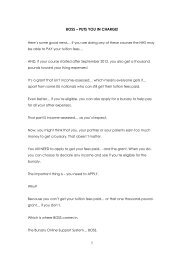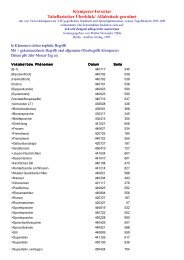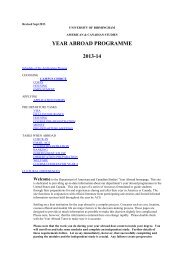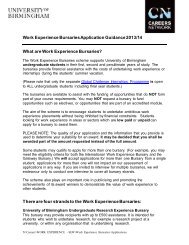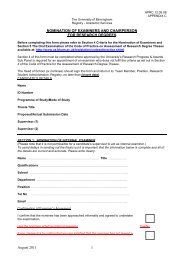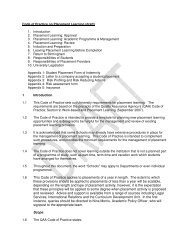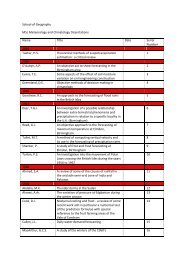Year 3 Module Outline (PDF 325KB) - University of Birmingham
Year 3 Module Outline (PDF 325KB) - University of Birmingham
Year 3 Module Outline (PDF 325KB) - University of Birmingham
Create successful ePaper yourself
Turn your PDF publications into a flip-book with our unique Google optimized e-Paper software.
03 24687 L3: SLEEP<br />
<strong>Module</strong> Leader: Dr Andrew Bagshaw<br />
Teaching Staff: Dr Andrew Bagshaw<br />
LEVEL: SEMESTER: CREDIT VALUE: CONTACT HRS:<br />
3 2 20 38<br />
RESTRICTION ON ENROLMENT: 50<br />
STATUS:<br />
Optional<br />
CONTACT HOURS:<br />
Lectures: 10 × 2 hours, 1 × 2 hour (exam review)<br />
Seminars: 3 × 2 hours<br />
Office hours: 10 × 1 hour<br />
MODULE DESCRIPTION/CONTENT:<br />
This module will be a comprehensive introduction to normal and pathological sleep, covering the topic<br />
from biological, neurological, psychological and psychiatric perspectives. We will discuss the<br />
classification and evolutionary purpose <strong>of</strong> sleep, examine the sleeping brain, and see how sleep affects<br />
cognition, and mental and physical health. The various types <strong>of</strong> sleep disorder will be introduced, along<br />
with their consequences on psychological and psychiatric function, their prevalence in the population, and<br />
methods <strong>of</strong> treatment. <strong>Module</strong> content will be delivered though lectures and discussion and practical<br />
sessions, and include the following topics:<br />
1. What is Sleep For<br />
2. The Sleeping Brain<br />
3. Sleep and Cognition<br />
4. Sleep and Mental Health<br />
5. Sleep and Physical Health<br />
6. Sleep Disorders<br />
KEY LEARNING OUTCOMES:<br />
On completion <strong>of</strong> this module the student will be able to:<br />
1. Describe and discuss the characteristics <strong>of</strong> sleep, the link between sleep patterns and mental and<br />
physical health, as well as what is understood about how sleep affects and contributes to cognition;<br />
2. Demonstrate understanding <strong>of</strong> the methods used to classify sleep and investigate the sleeping brain;<br />
3. Critically evaluate theories and evidence regarding the purpose <strong>of</strong> sleep;<br />
4. Understand the classification and symptomatology <strong>of</strong> sleep disorders.<br />
METHOD OF ASSESSMENT:<br />
Essay (40%): A 2000 word critical essay on a topic related to one <strong>of</strong> the lectures.<br />
Summer Examination: (60%)<br />
READING LIST:<br />
Reading will be empirical papers and book chapters selected by the module leader in relation to the topic<br />
being covered in each lecture. Examples include:<br />
Cirelli C, Tononi G (2008). Is sleep essential PLoS Biol 6(8): e2l6.<br />
Dang-Vu TT et al (2008). Spontaneous neutral activity during human slow wave sleep. Proc Natl Acad Sci USA<br />
105(39): 15160-15165<br />
Dikeos D and Georgantopoulos G (2011). Medical comorbidity <strong>of</strong> sleep disorders. Curr Opin Psychiatry 24:<br />
346-354<br />
Fernandez-Mendoza J et al (2010). Insomnia with objective short sleep duration is associated with deficits in<br />
neuropsychological performance: a general population study. Sleep 33(4): 459-465<br />
Wilhelm I et al (2011). Sleep selectively enhances memory expected to be <strong>of</strong> future relevance. J Neurosci 31(5):<br />
1563-1569<br />
18


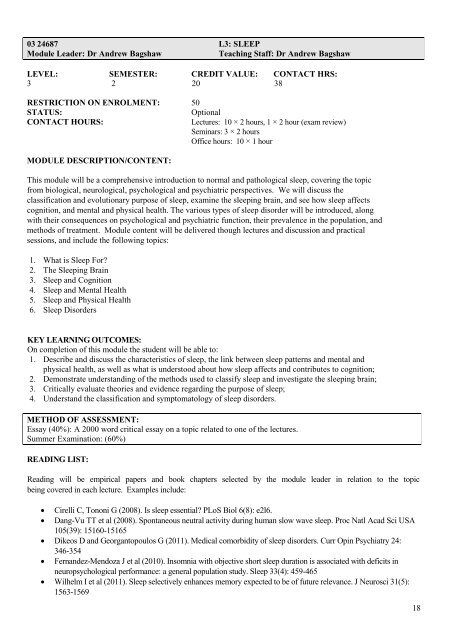
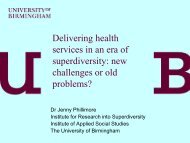
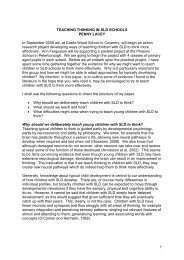
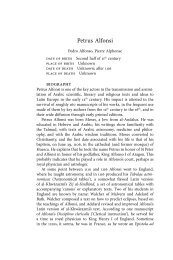
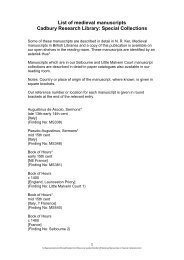
![Benyamin Asadipour-Farsani [EngD Conference abstract]](https://img.yumpu.com/51622940/1/184x260/benyamin-asadipour-farsani-engd-conference-abstract.jpg?quality=85)
